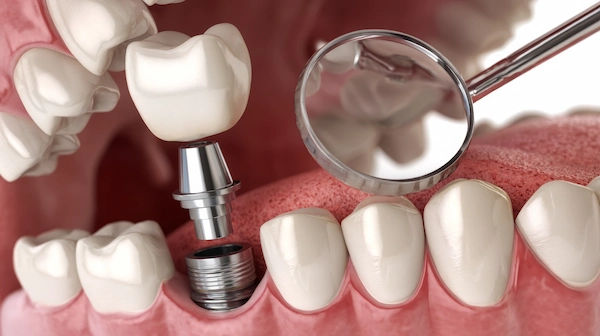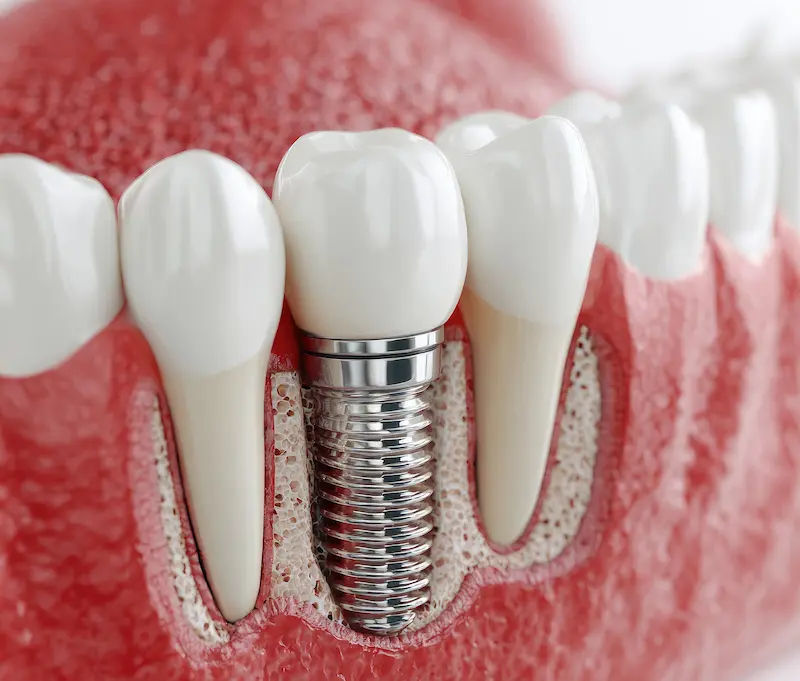Guide to Dental Implants Get Your Fixed Teeth Back in No Time
Know about the dental implants, procedure for implant, pre-requisites, risks, benefits, comparison, traditional replacement technique and more.


Introduction
Losing a tooth can feel like a significant loss, impacting not just your smile but your confidence and ability to enjoy everyday life. For decades, the only solutions were bridges or dentures, functional but often uncomfortable and temporary fixes. This comprehensive guide will walk you through everything you need to know about the dental implant process. We'll demystify the procedure, explore the incredible benefits, discuss the investment involved, and show you how this advanced treatment can restore not just your smile, but your quality of life. If you're dreaming of a fixed, secure solution for missing teeth, you're in the right place.
What Exactly is a Dental Implant? The Three-Part System
A dental implant is a small, biocompatible titanium post that is surgically placed into your jawbone. It serves as an artificial tooth root, providing a stable foundation for a replacement tooth. Unlike other options, an implant stands alone without relying on neighbouring teeth for support. The system consists of three key components:
Consult a Top Dental Surgeon for Personalised Advice
The Implant Fixture: Your New Artificial Root
This is the screw-like post, typically made of medical-grade titanium, that is inserted directly into the jawbone. Titanium is unique because it can fuse with living bone, a process known as osseointegration. This fusion creates an incredibly strong and durable anchor that is even more stable than a natural tooth root.
The Abutment: The Crucial Connector
Once the implant fixture has fully integrated with the jawbone, a small connector piece called an abutment is attached to it. This abutment protrudes slightly above the gum line, and its sole purpose is to securely hold the final prosthetic tooth (the crown) in place.
The Dental Crown: The Visible, Natural-Looking Tooth
The crown is the custom-made artificial tooth that everyone sees. It’s crafted from high-quality materials like porcelain or ceramic to match the colour, shape, and translucency of your surrounding natural teeth. It is attached to the abutment, completing the restoration and giving you a fully functional and aesthetically pleasing tooth.
Are You a Candidate for Dental Implants?
Most adults in good general health are excellent candidates for dental implants. However, a few key factors determine ideal candidacy:
1. Healthy Gums: You must be free from active periodontal (gum) disease.
2. Sufficient Jawbone Density: The implant needs enough bone to anchor into. If you've had missing teeth for a long time, bone loss may have occurred. Fortunately, bone grafting procedures can often rebuild the bone to support an implant.
3. Good Overall Health: Conditions like uncontrolled diabetes or habits like heavy smoking can hinder healing. It's crucial to discuss your full medical history with your dentist. If you have underlying health conditions, it's wise to consult a doctor online with Apollo24|7 to get a preliminary understanding of how they might affect a surgical procedure.
The Dental Implant Procedure: A Step-by-Step Journey
Understanding the process can ease any anxiety. The journey to getting your fixed teeth typically unfolds over several months, but is straightforward.
Step 1: Comprehensive Consultation and Planning
This is the most critical phase. Your dentist will conduct a thorough examination, including X-rays and likely a 3D CT scan, to assess your jawbone's quality and quantity and plan the precise placement of the implant.
Step 2: The Implant Placement Surgery
Performed under local anaesthesia (and sedation if needed), this minor oral surgery involves making a small incision in the gum to expose the bone. The dentist then precisely drills a pilot hole and inserts the titanium implant fixture into the jawbone. The gum is then stitched closed over the implant.
Step 3: The Healing Period (Osseointegration)
This is the "waiting" phase, typically lasting 3 to 6 months. During this time, the jawbone grows into and fuses with the surface of the implant, creating a solid foundation. This process is what makes implants so uniquely stable.
Step 4: Placing the Abutment and Final Crown
Once healing is complete, a minor second procedure is done to attach the abutment. After your gum tissue heals around this new connector (in a couple of weeks), your dentist will take impressions to create your custom crown. The final crown is then cemented or screwed onto the abutment, completing your smile.
Dental Implants vs. Traditional Tooth Replacement Options
How do dental implants truly compare to the older methods? The differences are significant.
Dental Implants vs. Dental Bridges
A bridge requires grinding down the two healthy teeth adjacent to the gap to support the false tooth. This damages otherwise healthy teeth. An implant stands independently, preserving your natural tooth structure. Bridges also have a shorter lifespan (10-15 years) compared to implants, which can last a lifetime.
Dental Implants vs. Full or Partial Dentures
Dentures can slip, click, and cause sore spots, making eating and speaking a challenge. They also accelerate bone loss in the jaw. Dental implants, whether supporting a single crown or a full denture, prevent bone loss and provide unparalleled stability. The benefits of implants over dentures include improved comfort, function, and confidence.
The Cost of Dental Implants: Investment vs. Expense
Let's be frank: the upfront cost of dental implants is higher than that of a bridge or dentures. A single implant can range significantly based on geographic location and case complexity. However, it's more accurate to view this as a long-term investment. While a bridge may need replacement every decade, a well-cared-for implant can last a lifetime, potentially making it more cost-effective over time. Factors affecting cost include the number of implants, the need for bone grafting, and the type of crown material.
The Unmatched Benefits of Choosing Dental Implants
The advantages extend far beyond a beautiful smile:
1. Natural Look and Feel: They are the closest thing to regenerating your natural teeth.
2. Improved Oral Health: Unlike bridges, they don't require altering adjacent teeth.
3. Durability and Permanence: With proper care, they can last a lifetime.
4. Enhanced Comfort and Function: Eat, speak, and smile with complete confidence.
5. Preservation of Jawbone: They stimulate the bone, preventing the facial collapse that occurs with tooth loss.
Potential Risks and How to Mitigate Them
Like any surgery, dental implant placement carries minimal risks, such as infection, nerve damage, or sinus issues. However, these are rare, especially when the procedure is performed by an experienced professional with thorough planning. Choosing a qualified implant dentist is your best defense against complications.
Life After Implants: Recovery and Long-Term Care
Recovery is generally manageable with mild discomfort. Your dentist will provide specific instructions. Long-term care is simple: treat your implants like your natural teeth. This means brushing twice daily, flossing regularly (using implant-specific floss if needed), and attending regular dental check-ups. Apollo24|7 offers convenient home collection for tests like HbA1c, which is crucial for diabetic patients to monitor before and after such procedures to ensure optimal healing.
Conclusion
Dental implants represent a pinnacle of modern restorative dentistry. They offer a permanent, healthy, and aesthetically superior solution for replacing missing teeth. While the process requires an investment of time and resources, the payoff is a restored smile, improved function, and a significant boost in quality of life that can last for decades. If you are tired of dealing with the limitations of bridges or dentures, take the first step. Schedule a consultation with a qualified dental professional to discuss if dental implants are the right path to getting your fixed teeth back in no time.
Consult a Top Dental Surgeon for Personalised Advice
Consult a Top Dental Surgeon for Personalised Advice

Dr Gaurav Jain
Oral and Maxillofacial Surgeon
21 Years • BDS, MDS
Delhi
Apollo Hospitals Indraprastha, Delhi

Dr. Saurabh Gupta
Dentist
12 Years • BDS, MDS (oral & maxillofacial surgery)
Kolkata
Being Dentist, Kolkata

Dr. Debarati Deb
Dentist
10 Years • BDS, MDS Oral Medicine and Radiology
Kolkata
Dr. Smile Multispeciality Dental Clinic, Kolkata

Dr. Aritra Mandal
Dentist
6 Years • BDS, MDS (PERIODONTOLOGY)
Kolkata
COSMI DENTAL, Kolkata

Dr. Shuvra Sengupta
Dentist
11 Years • BDS
Kolkata
Sensiv Dental Clinic, Kolkata
Consult a Top Dental Surgeon for Personalised Advice

Dr Gaurav Jain
Oral and Maxillofacial Surgeon
21 Years • BDS, MDS
Delhi
Apollo Hospitals Indraprastha, Delhi

Dr. Saurabh Gupta
Dentist
12 Years • BDS, MDS (oral & maxillofacial surgery)
Kolkata
Being Dentist, Kolkata

Dr. Debarati Deb
Dentist
10 Years • BDS, MDS Oral Medicine and Radiology
Kolkata
Dr. Smile Multispeciality Dental Clinic, Kolkata

Dr. Aritra Mandal
Dentist
6 Years • BDS, MDS (PERIODONTOLOGY)
Kolkata
COSMI DENTAL, Kolkata

Dr. Shuvra Sengupta
Dentist
11 Years • BDS
Kolkata
Sensiv Dental Clinic, Kolkata
More articles from Dental Implants
Frequently Asked Questions
1. How long does the entire dental implant process take?
The entire process, from consultation to final crown placement, typically takes between 3 to 9 months. The timeline largely depends on the need for any preliminary procedures like bone grafting and your individual healing speed.
2. Are dental implants painful?
The surgery itself is performed under anaesthesia, so you should feel no pain. Post-surgery, any discomfort is typically mild and can be managed with over-the-counter pain medication, similar to what you might experience after a tooth extraction.
3. What is the success rate of dental implants?
Dental implants have a very high success rate, consistently reported to be over 95% for healthy individuals. Their long-term success is heavily influenced by good oral hygiene and regular dental visits.
4. Can my body reject a dental implant?
Strictly speaking, implants are not 'rejected' like an organ transplant because titanium is biocompatible. Instead, an implant can fail to integrate with the bone, a condition called 'implant failure.' This is rare and is often linked to infection, poor bone quality, or systemic health issues.
5. Am I too old for dental implants?
There is no upper age limit for dental implants. Health and bone density are far more important factors than age. Many seniors are excellent candidates and greatly benefit from the stability implants provide, especially compared to traditional dentures.


